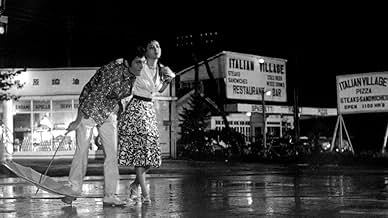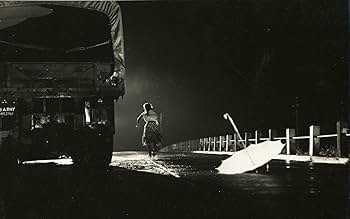Kuroi kawa
- 1957
- 1h 54min
VALUTAZIONE IMDb
7,2/10
1292
LA TUA VALUTAZIONE
Aggiungi una trama nella tua linguaA love triangle develops between a benevolent student, his innocent girlfriend, and a cruel petty criminal, all as a point of diagnosis of a social disease that had Japan slowly succumbing t... Leggi tuttoA love triangle develops between a benevolent student, his innocent girlfriend, and a cruel petty criminal, all as a point of diagnosis of a social disease that had Japan slowly succumbing to lawlessness during the post-War era.A love triangle develops between a benevolent student, his innocent girlfriend, and a cruel petty criminal, all as a point of diagnosis of a social disease that had Japan slowly succumbing to lawlessness during the post-War era.
- Regia
- Sceneggiatura
- Star
Recensioni in evidenza
Japanese drama from Shochiku and director Masaki Kobayashi. The story follows civil engineering student Nishida (Fumio Watanabe) as he moves into a slum apartment building near a U. S. army base. His fellow tenants struggle to survive by doing all sorts of unsavory things, while Nishida simply tries to keep his head down, concentrating on his studies, and staying out of trouble. Things get complicated when he falls for nice-girl waitress Shizuko (Ineko Arima), who has also caught the eye of young gang leader Killer Joe (Tatsuya Nakadai).
Director Kobayashi's film is meant as an indictment on post-war Japanese decadence and corruption, with a very critical eye toward the continuing U. S. military presence. Various concessions made for the comfort and convenience of the troops lead to poverty and squalor for the neighboring Japanese citizens, many of whom turn to petty crime and prostitution for survival. I think the director's message gets lost a bit in the love triangle, though. Watanabe makes for a passable lead, while Arima turns in another good turn, although not as impressive as that in Tokyo Twilight, which I watched yesterday. The real star is Nakadai, one of my favorite Japanese actors, here in his breakthrough role. He's menacing and compelling, while also imbuing what could have been a one-note psycho-thug with some depth and nuance. The film features excellent, moody cinematography, and the oppressive heat of the summer season is depicted very well.
Director Kobayashi's film is meant as an indictment on post-war Japanese decadence and corruption, with a very critical eye toward the continuing U. S. military presence. Various concessions made for the comfort and convenience of the troops lead to poverty and squalor for the neighboring Japanese citizens, many of whom turn to petty crime and prostitution for survival. I think the director's message gets lost a bit in the love triangle, though. Watanabe makes for a passable lead, while Arima turns in another good turn, although not as impressive as that in Tokyo Twilight, which I watched yesterday. The real star is Nakadai, one of my favorite Japanese actors, here in his breakthrough role. He's menacing and compelling, while also imbuing what could have been a one-note psycho-thug with some depth and nuance. The film features excellent, moody cinematography, and the oppressive heat of the summer season is depicted very well.
No one is innocent in the post-war Japan depicted in Masaki Kobayashi's Black River. The film focuses on a love triangle: the straight-laced bookseller Nishida and Yakuza gangbanger Joe compete for the affections of the bourgeois local girl Shizuko. The American military base looms large in the film but the action takes place outside of it, mostly in a nearby shantytown. Although he regards the American presence as pernicious, Kobayashi is clear as to where responsibility rests for immoral behaviour and deficiencies in character, namely, the individual and society as a whole.
Kobayashi challenges preconceived notions as to whether people of a certain class are virtuous or vicious. Appearances may reinforce the moral decay of a character, such as the rotten teeth of the unscrupulous landlord, or conceal it in the case of the beautiful and virginal Shizuko. In a disturbing scene, not one tenant is willing to donate blood to a man who is critically ill--not even his own wife. Nishida at least deigns to admit that, in spite of having the correct blood type, he does not want to donate his blood. He may feel that the man, apparently less educated and of a lower class than him, is unworthy of his blood. However, his refusal is as callous and cowardly as that of the other tenants, exposing his apparent nobility as a mere façade.
Black River exhibits the characteristic influence of film noir whose origin is American popular culture. Just as the presence of the American military corrupts Japanese society in the film, American culture has, as it were, corrupted Black River. Kobayashi paints in black and white a quasi-dystopian picture of a society that, having abandoned its principles, has descended into paranoia and mutual sabotage. The stylized and disinterested depictions of characters betray a moral ambivalence to their actions. Sultry jazz music, a distinctly American genre, provides the score of the film. Like the cinematography, its expression suggests that sordid deeds, places, and people are at hand.
In general, Kobayashi juggles the large cast of characters skillfully. However, their number can distract from the film's main plot about the love triangle, leading to a loss of focus and making it difficult to identify with any one character. Humour often shines through the dark subject matter, notably in a quarrel about emptying outhouses and the use of communal space. Like most film noir, Black River occasionally wavers into campiness and mannerism.
Kobayashi crafts a powerful ending to commit the metaphorical assassination of Shizuko's character. Once again, the Americans act as an accomplice but crucially not as the malefactor, the person ultimately responsible. Perhaps for the first time in the film, a character reflects on her own behaviour and is profoundly disgusted. Contemporary viewers will likely, as I did, have more sympathy for some characters and forgive them in light of the ordeals they have experienced or the circumstances in which they live. Nonetheless, Kobayashi makes a powerful argument, not to mention an excellent film that will appeal to fans of post-war cinema, film noir, and Japanese culture.
Kobayashi challenges preconceived notions as to whether people of a certain class are virtuous or vicious. Appearances may reinforce the moral decay of a character, such as the rotten teeth of the unscrupulous landlord, or conceal it in the case of the beautiful and virginal Shizuko. In a disturbing scene, not one tenant is willing to donate blood to a man who is critically ill--not even his own wife. Nishida at least deigns to admit that, in spite of having the correct blood type, he does not want to donate his blood. He may feel that the man, apparently less educated and of a lower class than him, is unworthy of his blood. However, his refusal is as callous and cowardly as that of the other tenants, exposing his apparent nobility as a mere façade.
Black River exhibits the characteristic influence of film noir whose origin is American popular culture. Just as the presence of the American military corrupts Japanese society in the film, American culture has, as it were, corrupted Black River. Kobayashi paints in black and white a quasi-dystopian picture of a society that, having abandoned its principles, has descended into paranoia and mutual sabotage. The stylized and disinterested depictions of characters betray a moral ambivalence to their actions. Sultry jazz music, a distinctly American genre, provides the score of the film. Like the cinematography, its expression suggests that sordid deeds, places, and people are at hand.
In general, Kobayashi juggles the large cast of characters skillfully. However, their number can distract from the film's main plot about the love triangle, leading to a loss of focus and making it difficult to identify with any one character. Humour often shines through the dark subject matter, notably in a quarrel about emptying outhouses and the use of communal space. Like most film noir, Black River occasionally wavers into campiness and mannerism.
Kobayashi crafts a powerful ending to commit the metaphorical assassination of Shizuko's character. Once again, the Americans act as an accomplice but crucially not as the malefactor, the person ultimately responsible. Perhaps for the first time in the film, a character reflects on her own behaviour and is profoundly disgusted. Contemporary viewers will likely, as I did, have more sympathy for some characters and forgive them in light of the ordeals they have experienced or the circumstances in which they live. Nonetheless, Kobayashi makes a powerful argument, not to mention an excellent film that will appeal to fans of post-war cinema, film noir, and Japanese culture.
From that beautiful classic rumble like music they blare frequently, to the cast sporting unique bright clothing in high contrast to the dark or black backgrounds that often inhabit the screen, the look and feel of this film is true noir, fantastic cinematography, and a dark themed plot.
Complete with romance, gang violence, a slumbers handing out evictions, and a love triangle. . Id call the plot original. And enthralling, in plain terms.
I put this up against classics like M, Chinatown, the Crimson Kimono.
Complete with romance, gang violence, a slumbers handing out evictions, and a love triangle. . Id call the plot original. And enthralling, in plain terms.
I put this up against classics like M, Chinatown, the Crimson Kimono.
The story is set around an American Air Force base which has attracted bars and brothels and the native Japanese who need this sordid world to scape by and make money to just barely survive. A love triangle develops among the dwellers of a falling down apartment building and a local gangster called Killer Joe.
It's a fascinating slice of life with engaging vivid seedy characters, these type of shanty towns always develop around military bases, I can't think of any other films I've seen that take place there. It's a rare look into the postwar lower middle class and lower end criminal element in Japan. Fast moving and convincing well worth watching if you can find it. Memorable ending and last image to a memorable film.
It's a fascinating slice of life with engaging vivid seedy characters, these type of shanty towns always develop around military bases, I can't think of any other films I've seen that take place there. It's a rare look into the postwar lower middle class and lower end criminal element in Japan. Fast moving and convincing well worth watching if you can find it. Memorable ending and last image to a memorable film.
"Kuroi kawa" ("Black River") is a most unusual Japanese film. While most films from this era tell stories about love or samurai warriors from the past, this one is planted firmly in post-war Japan...and among the lowest classes of society. Instead of showing nice folks, most people in the film are of the dregs...prostitutes, pimps, voyeurs, thugs and the like. And, for the most part, these people are incredibly ugly...not just spiritually but physically as well. It seems that director Masaki Kobayashi wanted to expose this ugliness...and the film is indeed an indictment of this. And, I am pretty sure Japanese audiences must have been shocked to see this!
The story is set in an incredibly seedy rooming house near a US military base. Most of the residents seem like degenerates and yet, oddly, a seemingly nice engineering student decides to live among them in order, he claims, to save money. It's hard to believe anyone living there who has any other options. He is interested in a lady who works as a waitress but before they can develop a relationship, she is kidnapped and raped by a creep they nickname 'Joe the Killer'! Now, she's stuck in a relationship with Joe...as he refuses to let her go, as she is now his 'property'. And, so she is hoping, somehow, the student will be able to rescue her from her plight with this violent brute.
If you are looking for a nice film or one that leaves you happy, then by all means do NOT watch this movie. Now it's not a bad film....but it is a bit depressing and sad to watch. After all, it's about the writer's perceptions about he breakdown of the social fabric in Japan. Interesting, very well crafted...and, at times, hard to watch.
The story is set in an incredibly seedy rooming house near a US military base. Most of the residents seem like degenerates and yet, oddly, a seemingly nice engineering student decides to live among them in order, he claims, to save money. It's hard to believe anyone living there who has any other options. He is interested in a lady who works as a waitress but before they can develop a relationship, she is kidnapped and raped by a creep they nickname 'Joe the Killer'! Now, she's stuck in a relationship with Joe...as he refuses to let her go, as she is now his 'property'. And, so she is hoping, somehow, the student will be able to rescue her from her plight with this violent brute.
If you are looking for a nice film or one that leaves you happy, then by all means do NOT watch this movie. Now it's not a bad film....but it is a bit depressing and sad to watch. After all, it's about the writer's perceptions about he breakdown of the social fabric in Japan. Interesting, very well crafted...and, at times, hard to watch.
Lo sapevi?
- QuizTatsuya Nakadai's first major role for director Kobayashi, starting a partnership that lasted over 15 years and 10 films.
- ConnessioniReferences La figlia di Nettuno (1949)
I più visti
Accedi per valutare e creare un elenco di titoli salvati per ottenere consigli personalizzati
- How long is Black River?Powered by Alexa
Dettagli
- Tempo di esecuzione1 ora 54 minuti
- Colore
- Mix di suoni
- Proporzioni
- 1.37 : 1
Contribuisci a questa pagina
Suggerisci una modifica o aggiungi i contenuti mancanti














